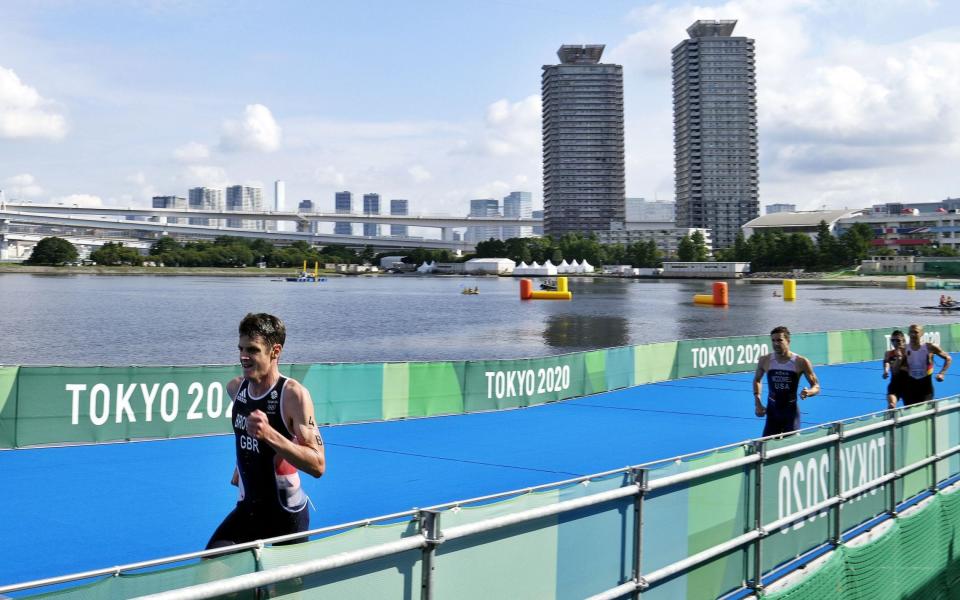Team GB storm to gold medal in first ever Olympic triathlon mixed relay after consummate performance

In his third Olympics, after twice ending up lower on the podium than his brother Alistair, Jonathan Brownlee finally got his hands on a gold medal. And judging by the grin he wore as he found himself part of the victorious British quartet in the first ever mixed team Olympic triathlon relay, it was a moment he had been waiting for.
“It’s about time,” he said afterwards. “I keep on trying to get gold medals, Alistair’s won two so far and to go home with one and get towards matching him is super special. And it’s also the first ever mixed team relay in triathlon so we’ve made history in that. I feel like I’ve been a part of a lot of history in my career and that’s just another one. It’s capped off my Olympic career amazingly.”
In a stunning setting in Tokyo Bay, between the temporarily installed five giant Olympic rings and the sweeping Rainbow Bridge, the Great Britain triathlon team of Brownlee, Jessica Learmonth, Georgia Taylor-Brown and Alex Yee performed with the kind of ruthless, cold-eyed certainty that has become a feature of what must now be numbered among the most decorated of British sports. It is a sport, moreover, in which the future looks as bright as the Brownlee-tinged past. With the two brothers now stepping away from Olympic events, in Taylor-Brown and Yee, who had both achieved silvers in the individual races, Britain is blessed with a surfeit of substantial talent.
Because make no mistake about it, this was a quite brilliant effort by the four Britons, each of them delivering the very peak of performance, as they outpaced the fifteen other national teams. Under the constant swoop of two television helicopters, they went out in turn in the sauna-steam heat and each looked immediately at ease, none of them making a single mistake in the busy turnover sections.
First they swam 300 metres across the bay. Then, they ran out of the water, picked up their bikes and cycled off for 6.8 kilometres, spinning round under the flyovers and railway viaducts, past the shopping centres of inner Tokyo. Then, parking their bikes and pulling on their running shoes, they embarked on the 2k run taking them on a loop of the Marine Park, along the shorefront.
It was a constant sprint, a relentless dash. There was no time to recover the breath, no time to rest up, the pace was unyielding. The toughness of the execution was evident as many an athlete collapsed as they handed over to the next member of their team; Ainsley Thorpe of New Zealand was taken off in a wheelchair.
Learmonth was first off for Great Britain. Although the least decorated of the quartet in terms of championship victories, she showed little sense of nerves. Keeping pace through the swim, into the ride and run, she handed over to Brownlee neck and neck with the United States. The Yorkshire veteran waited for her in the tag zone, ready to dash down to the swim.
Fortunately, given British relay teams’ chequered history with them, there was no baton to drop. Learmonth simply slapped hands with Brownlee and he was off, belting down to the water’s edge and executing a perfect running dive. Leading in the swim, he headed off out of the cycle leg still out in front, a position he maintained throughout the run. Nine seconds was the gap between him and the French and Americans on his heels that he handed over to Taylor-Brown. She delivered a flawless effort: smooth and efficient in the transition, turbo-charged in action. And this time, unlike in the individual event, she made it round the cycling leg without incurring a puncture. A brilliant runner (she was an international standard cross-country competitor before taking up the triathlon), she lengthened the lead, lapping several of the back markers on her second spin round the course.

She had turned the gap into a 21-second one as she made her handover to fellow silver medallist Yee. The 23-year-old from Lewisham looked calm as he legged it to the water’s edge. But he admitted afterwards, the scale of what lay ahead was daunting.
“I mean for me I was pretty nervous going onto the last leg,” he said. “But in a way my job was the easy one, I just had to get round and finish first.”

He was off, smooth, efficient, despite knowing that the American, Morgan Pearson, and the Frenchman, Vincent Luis, were closing in on him as he moved off on to his bike. Indeed Luis, the world champion, chased him down and overtook him, producing a whoop of excitement from the French press corps. But the surge had taken it out of him, and Yee was able to sit behind him for the rest of the cycle stage, easing into his draft, allowing him to do all the work, sensing he was tiring. When Luis slightly fumbled trying to get into his training shoes for the run, Yee was away, his long stride eating the distance, making sure the British lead was intact at the most important moment of the race: the end. And up in the stands, the elder Brownlee brother was there, watching as Yee crossed the line in first place to fall into an eager embrace with his three delighted team-mates.
“He's never said it to me, but I know for a long time that he's wanted gold,” Alistair said of Jonny. “And he never wanted to touch my medals. He thought it was bad luck. It's awesome for him and I'm really happy.”
Awesome is the right word. What a victory this was: relentless, determined, unyielding. In fact, very Brownlee.

 Yahoo Sport
Yahoo Sport 




































